Dog allergies are more common than most owners realize, especially in affectionate, energetic breeds like golden retrievers. From itchy skin to chronic ear infections, signs and symptoms of allergies in dogs can vary greatly and often go unnoticed until they become severe. The Golden retrievers are potentially prone to allergies due to their genetic makeup, coat texture, and lifestyle. As a result, they often suffer from a variety of allergy-related issues, from sneezing and licking to digestive issues and irritation. However, since not all reactions are immediate or obvious, it’s important for dog owners to know what to look out for.
In this comprehensive guide, we’ll cover the most common signs and symptoms of allergies in dogs, especially in golden retrievers. Along with learning how to identify allergy responses early and what to do if your golden retriever exhibits symptoms, you will also learn about environmental and dietary factors. Whether you’re a new dog owner or a seasoned Golden Retriever lover, this blog will give you the tools to help keep your pup comfortable, healthy, and allergy-free.
Contents
- 1 Can Golden Retrievers Have Allergies?
- 2 Common Causes of Allergies in Golden Retrievers
- 2.1 Food Allergens
- 2.2 Environmental Allergens
- 2.3 Flea Saliva
- 2.4 Contact Irritants
- 2.5 The Most Common Signs and Symptoms of Allergies in Dogs
- 2.6 Itchy Skin and Excessive Scratching
- 2.7 Ear Infections
- 2.8 Gastrointestinal Upsets
- 2.9 Red, Watery Eyes or Sneezing
- 2.10 Chronic Paw Licking and Chewing
- 2.11 Behavior Changes
- 3 Behavioral Signs of Allergies in Golden Retrievers
- 4 Diagnosing Allergies in Golden Retrievers
- 5 Allergies or Something Else?
- 6 What to Do If You Notice These Symptoms in Your Dog
- 7 Prevent Allergies before They Start
- 8 Are Golden Retrievers Hypoallergenic? Myth Busted
- 9 Final Thoughts: How to Keep Your Golden Retriever Free of Allergies
Can Golden Retrievers Have Allergies?
Yes, Golden Retrievers can definitely have allergies — and in fact, they are one of the most allergenic breeds. Whether its food, environmental factors, or flea bites, many Golden Retrievers experience allergic reactions throughout their lives. So it’s important for owners to recognize the signs and symptoms of allergies in dogs, especially in this sensitive breed.
Golden Retrievers are genetically predisposed to conditions like eczema, food intolerances, and contact allergies. Their friendly, playful nature means they spend a lot of time outdoors, which exposes them to common allergens like pollen, mold, and grass. Plus, their thick, double coat easily traps irritants — the perfect breeding ground for rashes and itching.
Important facts every golden retriever owner should know:
- Allergies can occur at any age, but symptoms usually appear between the ages of one and three.
- Typical early symptoms include skin problems such as redness, hot spots, and persistent itching.
- Digestive problems such as vomiting or loose stools can be signs of a food allergy.
- Some golden retrievers develop chronic ear infections that are accompanied by allergic reactions.
Understanding that your dog may have allergies is the first step, but recognizing the actual signs and symptoms of allergies in dogs, can really help. Early detection of allergies in Golden Retrievers can leads to the improved treatment, less distress, and eventually reduced veterinary expenses.
Common Causes of Allergies in Golden Retrievers
To effectively treat allergies in Golden Retrievers, it is important to understand their causes. Allergies in dogs occur when the immune system overreacts to normally harmless substances. These allergens can be found in food, the environment, or even on your golden retriever’s skin. When exposed, your dog may exhibit signs and symptoms of allergies in dogs, ranging from itchy skin to digestive issues. Here are the most common causes of allergies in golden retrievers:
Food Allergens
Many golden retrievers suffer from food allergies. The most common food allergens include:
- Chicken
- Beef
- Dairy
- Wheat
- Soy
Regular consumption of these ingredients can cause itching, ear infections, or gastrointestinal upset—important signs and symptoms of allergies in dogs that should not be ignored.
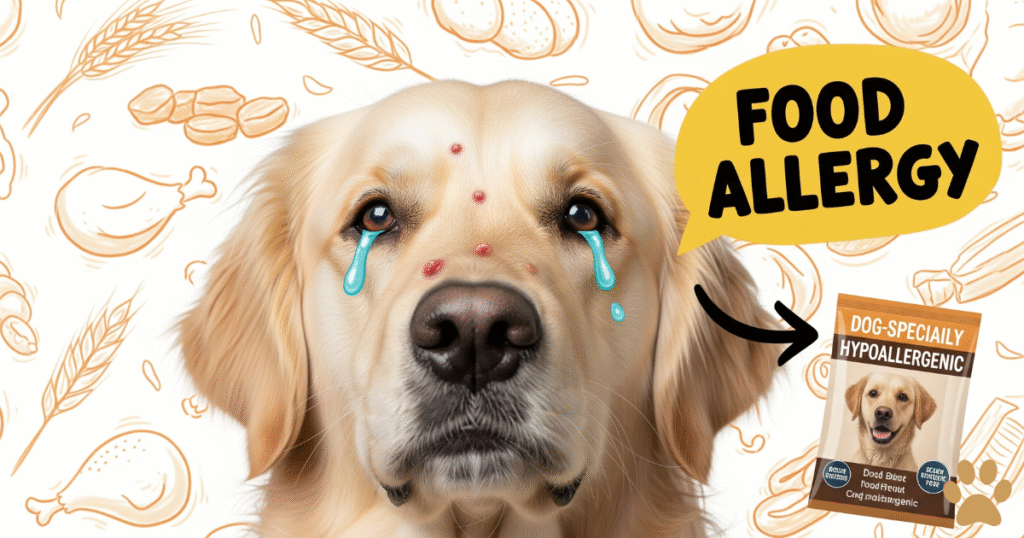
Environmental Allergens
The main culprits are outdoor allergens like pollen, grass, weeds, mold spores, and dust mites. These irritants often settle on your dog’s fur and paws after play, especially in thick-coated golden retrievers. They can cause seasonal allergies that include sneezing, watery eyes, or persistent itching.
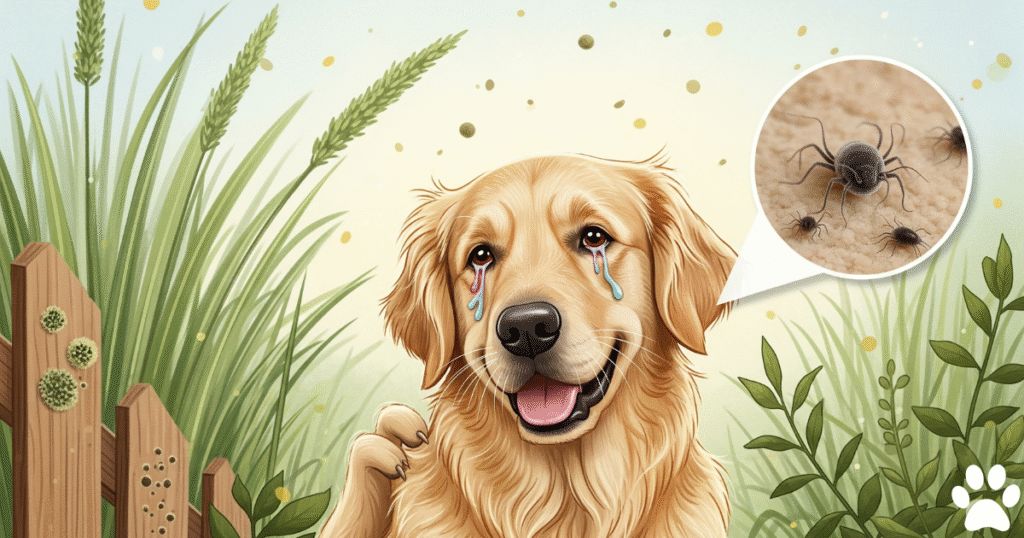
Flea Saliva
One of the most severe allergic reactions in dogs is caused by flea bites, specifically the proteins in their saliva. Even one bite can lead to a full-body allergic reaction known as flea allergy dermatitis.
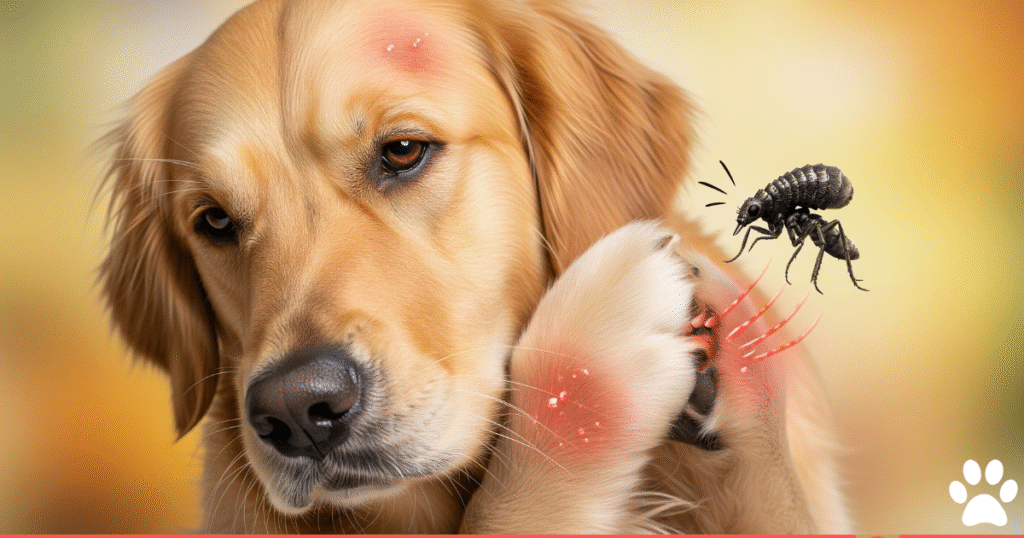
Contact Irritants
Shampoo, detergents, plastic bowls, and synthetic fabrics can also cause allergic skin reactions in some dogs. These usually occur where an allergen comes into contact with your dog’s skin.
The Most Common Signs and Symptoms of Allergies in Dogs
Golden Retrievers are loving and devoted companions, but they are also one of the breeds most prone to allergies. Allergies in dogs can present themselves in a variety of ways, whether they are caused by food, fleas, or the environment. Identifying these signs and symptoms of allergies in dogs early can prevent unnecessary discomfort and allow for faster, more effective treatment.
Let’s take a look at the most common allergy symptoms you may notice in your Golden Retriever. Identifying these signs and symptoms of allergies in dogs, especially Golden Retrievers, early can help you and your veterinarian develop a personalized treatment plan:
Itchy Skin and Excessive Scratching
Constant itching is one of the most common signs and symptoms of allergies in dogs. Golden Retrievers may chew on their paws, scratch their sides, rub their noses, or lick certain areas constantly. Over time, this can lead to bald spots, reddened skin, or painful sores called hot spots.
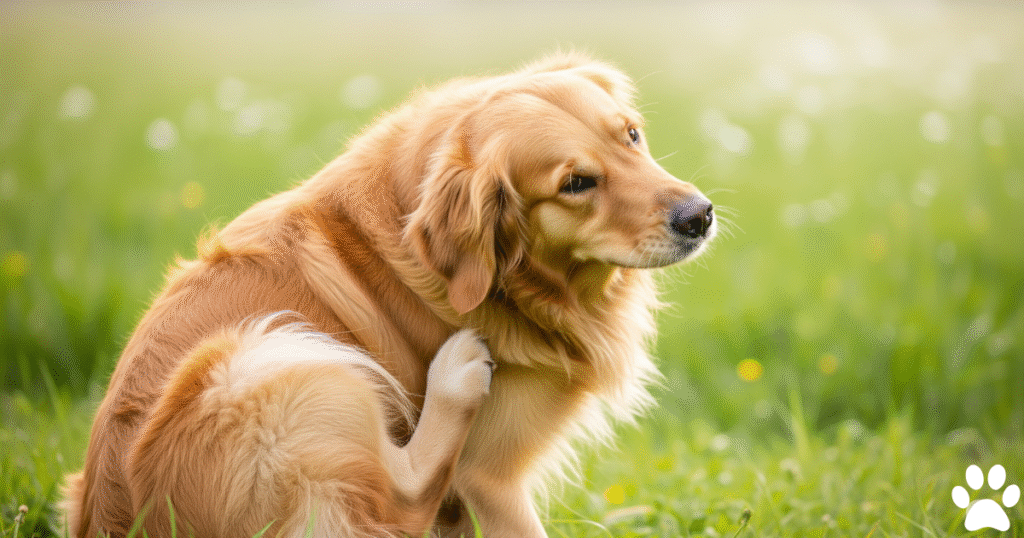
Ear Infections
Recurring ear infections are a clear warning sign, especially in golden retrievers. If your dog shakes his head, scratches his ears, or you notice a foul odor or dark discharge, it could be an allergy.
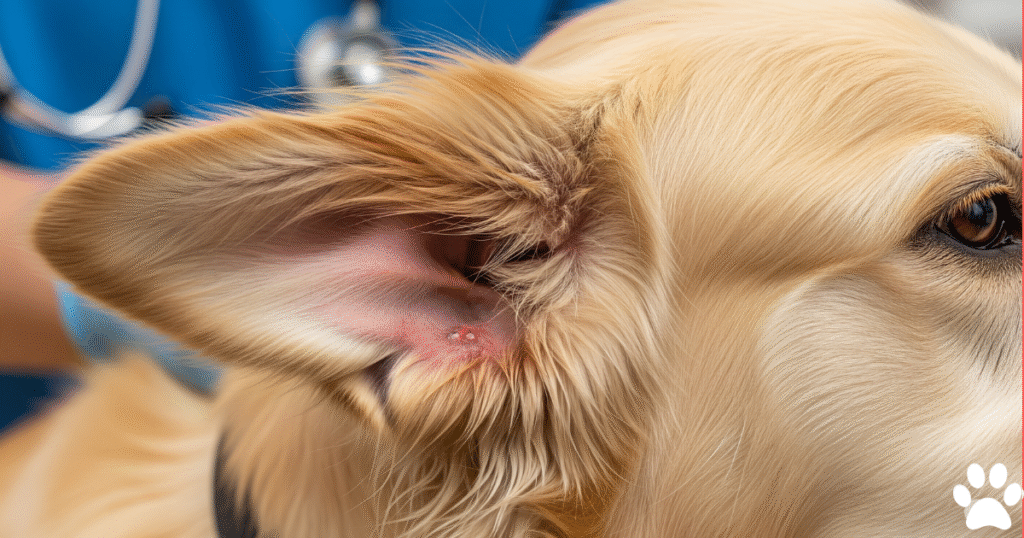
Gastrointestinal Upsets
Not all allergies cause skin reactions. Food allergies typically involve vomiting, diarrhea, gas, or bloating. These internal signs and symptoms of allergies in dogs are sometimes mistaken for an upset stomach, but in breeds like golden retrievers, they are often related to allergies.
Red, Watery Eyes or Sneezing
If your dog appears to have seasonal allergies—sneezing, runny nose, watery eyes—environmental factors like pollen or dust could be the culprit.
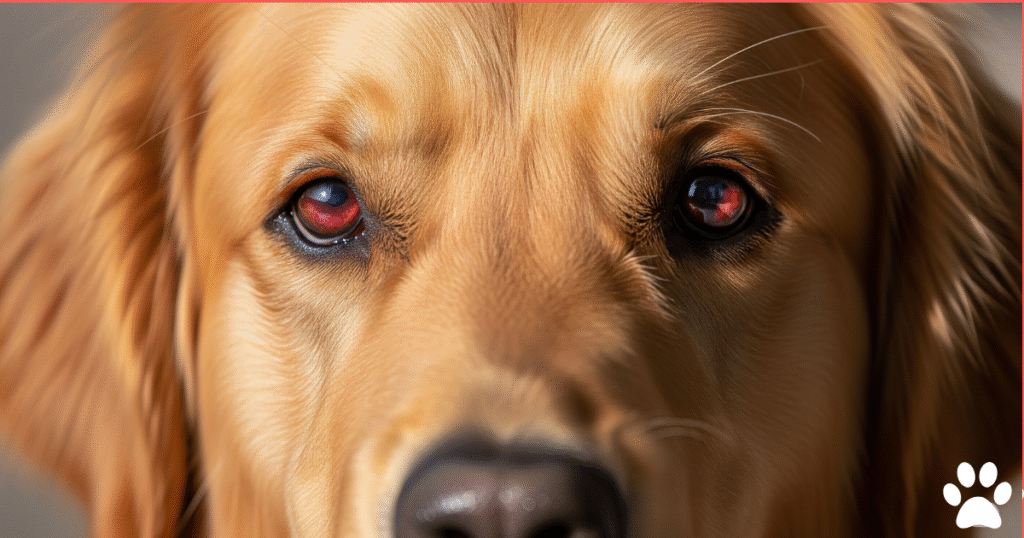
Chronic Paw Licking and Chewing
Dogs with allergies often lick or chew their paws to relieve discomfort. They may notice discoloration or irritation, especially between the toes and on the soles of the feet.
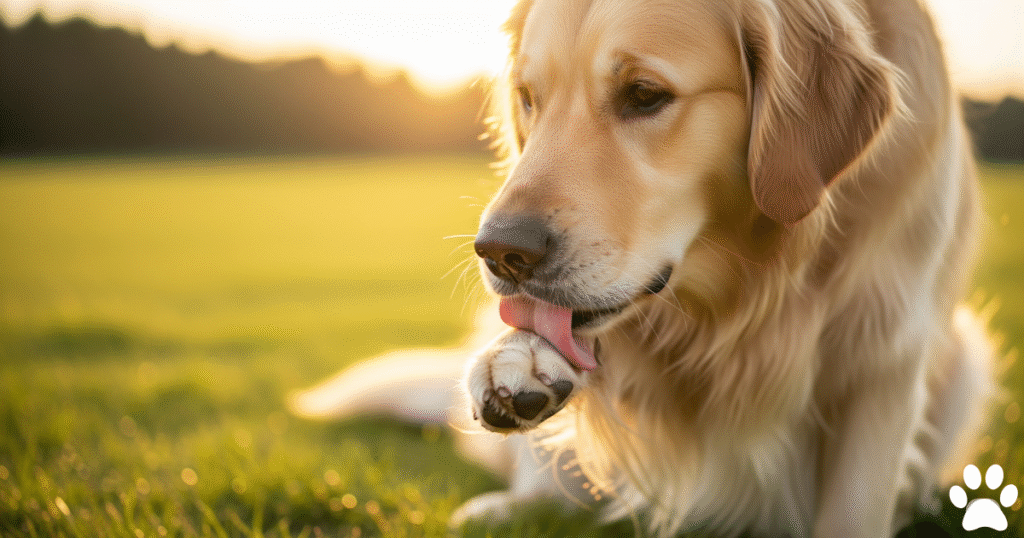
Behavior Changes
Allergic reactions can also cause mood swings, restlessness, or anxiety. A normally calm dog may become irritable or lethargic when excited or unwell.
Behavioral Signs of Allergies in Golden Retrievers
Since not all indications of allergies in dogs are physical, owners must pay close attention to their behavior. Some of the most noticeable signs are changes in the Golden Retriever’s behavior. Dogs frequently display their illness in subtle ways since they are unable to communicate it to humans. If your Golden Retriever isn’t acting as happy and energetic as usual, allergies may be the cause. Let’s take a closer look at the behavioral signs of allergies in Golden Retrievers:
Increased Irritability or Restlessness
A dog that is constantly scratching itself or has stomach issues may seem more irritable or restless. If you’re normally docile Golden Retriever starts biting other pets or avoiding contact, consider whether it’s reacting to an allergen.
Compulsive Paw Licking or Chewing
Excessive licking, especially of the paws, legs, or belly, is a common allergy behavior. Your dog may be licking a painful region or chewing on his paws all the time. This behavior is one of the most overlooked signs and symptoms of allergies in dogs, but is common in Golden Retrievers.
Decreased Appetite or Food Avoidance
If your dog refuses to eat or shows no interest in snacks that he usually enjoys, this may be a sign of a food allergy. Digestive upset, nausea, or allergic reactions to ingredients can affect your dog’s appetite.
Sleep Disturbances
Dogs with allergies often wake up more frequently at night due to itching or discomfort. If your Golden Retriever is having trouble sleeping or is tossing and turning at night, allergies may be disrupting his sleep.
Diagnosing Allergies in Golden Retrievers
If you notice signs and symptoms of allergies in dogs, especially in your Golden Retriever, the next step is to get a proper diagnosis. Even if some symptoms seem mild, untreated allergies can worsen over time and lead to chronic health problems like skin infections, digestive issues, and ongoing discomfort. Here’s what to expect when you take your Golden Retriever to the vet for an allergy test:
Complete Physical Exam
Your vet will start with a complete physical exam, looking at your dog’s skin, ears, paws, and overall health. They’ll ask questions about their environment, diet, routine, and when symptoms began. This will help determine possible allergy types and triggers.
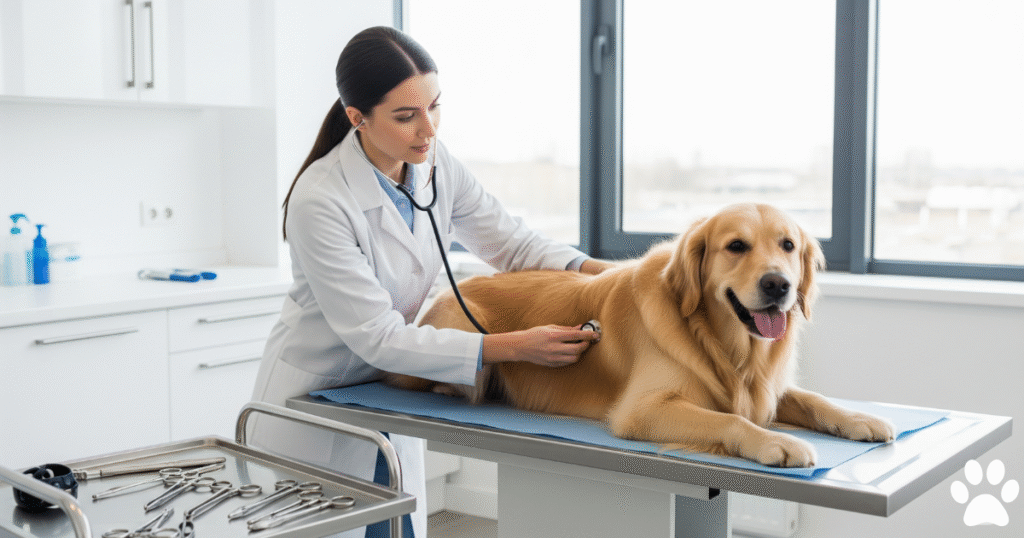
Rule Out Other Conditions
Because the signs and symptoms of allergies in dogs are often associated with other problems, such as parasitic infections, mange, or hypothyroidism, your veterinarian will first try to rule out these possibilities. Fleas, in particular, are a common and treatable cause of allergy symptoms.
Skin or Blood Allergy Test
For environmental allergies, your veterinarian may recommend:
- Intradermal skin testing is the gold standard for diagnosing environmental allergies
- Serological blood tests are useful if your dog cannot pass a skin test
These tests can detect a reaction to allergens such as dust mites, mold, trees, grasses, and pollen — common irritants for golden retrievers.
Elimination Diet
If a food allergy is suspected, your vet may recommend a strict elimination diet for 8-12 weeks using a reduced-ingredient diet or hydrolyzed protein. They will then gradually reintroduce common ingredients to determine the culprit.
Allergies or Something Else?
Many signs and symptoms of allergies in dogs can resemble other common conditions, especially in Golden Retrievers. So it’s important not to jump to conclusions or self-diagnose. Some non-allergic conditions have similar symptoms, such as itching, skin irritation, or digestive problems. Here are some conditions that can resemble allergies in dogs:
Mange (Mites)
Mange, caused by tiny skin mites, can cause intense itching, redness, and patchy hair loss — similar to an allergic reaction. In cases of demodectic mange or sarcoptic mange, a skin scraping is usually required for diagnosis.
Fungal or Bacterial Infections
Fungal and bacterial infections can cause ear discharge, a musty odor, skin inflammation, and itching. These infections are sometimes the result of allergies, but can also occur on their own.
Thyroid Disease (Hypothyroidism)
Low thyroid hormone levels in Golden Retrievers can result in dry, flaky skin, thinning fur, and lethargy—signs that can be mistaken for allergies. A simple blood test can confirm or rule out this possibility.
Flea Infestation (Non-Allergy)
Even if your dog is not allergic to fleas, a heavy flea infestation can cause itching, scratching, and skin problems. If you find live fleas or their feces, treat them immediately before assuming an allergy.
What to Do If You Notice These Symptoms in Your Dog
If you notice signs and symptoms of allergies in dogs, especially in sensitive breeds like the Golden Retriever, early intervention can be critical. Allergies rarely go away on their own — in fact, they often get worse over time if left untreated. Whether it’s constant paw licking, ear infections, or digestive issues, here’s what to do if your Golden Retriever shows signs of an allergic reaction:
Step 1 — Document the Symptoms
First, note what to look for:
- When the symptoms occur (seasonally, after meals, outdoors, etc.)
- What body parts are affected (ears, legs, belly)?
- Frequency and severity (occasional itching or constant chewing)
- This information will help your veterinarian make a faster, more accurate diagnosis.
Step 2 – Check Diet and Environment
Temporarily switching to a hypoallergenic or low-calorie dog food can help eliminate common food allergens like chicken, beef, wheat, or soy. In the meantime, clean or replace your dog’s bedding, replace cleaning products, and clean his paws after walks.
Step 3 – Make an Appointment with Your Vet
Even if symptoms seem manageable, a visit to the vet is necessary. Your vet can determine if the problem is caused by allergies and may recommend skin tests, blood tests, or an elimination diet to confirm.
Step 4 – Avoid Over-the-Counter Medications Without a Vet’s Advice
While it may be tempting, you should not give human medications like Benadryl without your vet’s approval. Dosage and safety vary by breed, size, and condition.
Step 5 – Follow the Treatment Plan Consistently
Once diagnosed, follow your veterinarian’s treatment plan carefully. Allergy relief often requires a combination of dietary changes, medications, medicated shampoos, and lifestyle changes.
By recognizing the signs and symptoms of dog allergies early and taking prompt action, you can prevent unnecessary suffering and help your Golden Retriever become happy and playful again.
Prevent Allergies before They Start
While it’s not always possible to prevent the signs and symptoms of allergies in dogs, especially in Hypoallergenic breeds like Golden Retrievers, there are many ways to reduce the risk of allergies. Prevention is key – not only has to minimize your dog discomfort, but also to avoid repeated vet visits and long-term medications. Here are some smart preventative strategies that all Golden Retriever owners should follow:
Regular Grooming
Golden Retrievers have a thick, double coat that can trap allergens like pollen, dust, and mold. Brush your dog three to four times a week and bathe him with a hypoallergenic shampoo to eliminate potential irritants before they cause problems. This is especially effective in minimizing the signs and symptoms of allergies in dogs.
Clean Your Dog’s Environment Regularly
Vacuum carpets, wash bedding weekly, and use an air purifier to reduce the amount of environmental allergens in your home. Consider switching to stainless steel or ceramic bowls and using fragrance-free cleaning products to prevent contact allergies.
Use Flea Prevention Year-Round
Fleas can cause serious allergic reactions. Even a single bite of flea can cause intense itching in sensitive dogs. Always follow your veterinarian’s recommended flea prevention plan for your Golden Retriever—monthly treatments are easy and effective.
Feed your dog a balanced, allergen-free diet.
If your dog has dietary allergies, stay away from common allergens including wheat, soy, meat, and chicken. Choose a high-quality, limited-ingredient dog food or talk to your veterinarian about a prescription hypoallergenic diet.
Are Golden Retrievers Hypoallergenic? Myth Busted
If you or someone in your family is prone to pet allergies, you may be wondering: Are Golden Retrievers Hypoallergenic? Golden Retrievers are not regarded as a hypoallergenic breed, despite their loving disposition and reputation as a family-friendly breed. In fact, they may be one of the most common breeds to trigger allergies in allergy-prone owners, and are themselves susceptible to the signs and symptoms of allergies in dogs. The term “hypoallergenic dog” is often misunderstood. No dog is 100% hypoallergenic, as all dogs produce proteins in their saliva, dander (dead skin cells), and urine that can trigger allergic reactions in humans. Breeds vary in the amount of these allergens they produce and how quickly they shed them.
Golden retrievers have a thick double coat and shed heavily year-round, especially with the changing seasons. Their fur and dander spread allergens throughout the home, making them unsuitable for people with allergies. Ironically, while golden retrievers can cause allergies in people, they can also cause allergies for dogs, primarily due to skin and dietary issues. So if you notice allergy symptoms in your golden retriever or yourself, it’s important to take action. Regular grooming, using air purifiers, and minimizing exposure to triggers can help, but they won’t make your golden retriever hypoallergenic.
Final Thoughts: How to Keep Your Golden Retriever Free of Allergies
Golden retrievers may be prone to allergies, but that doesn’t mean your beloved four-legged friend has to suffer. Recognizing the signs and symptoms of allergies in dogs, especially golden retrievers, is a step toward living a healthier, more enjoyable life. From itchy skin and chronic ear infections to digestive issues and behavioral changes, allergies present themselves in many different ways. The good news? With the right approach—diagnosis, treatment, and prevention—you can effectively control these symptoms. Whether your dog is reacting to food, fleas, or environmental irritants, early action can make all the difference. Remember: allergies for dogs, especially in breeds like the golden retriever, are often persistent but manageable. Working with your veterinarian, keeping your home clean, feeding a high-quality diet, and using natural or prescription treatments can help minimize flare-ups and long-term damage.
And most importantly, never ignore subtle changes in your Golden Retriever’s behavior or health. Even simple signs like nail biting or loss of appetite can be early warning signs. Take note of these changes and seek veterinary advice to give your dog the relief he deserves. Your Golden Retriever gives you unconditional love – repay him by being proactive, patient, and attentive to his allergies. Together, you can conquer the itch and get back to happy, tail-wagging adventures!
Dr. Nabeel A.
Hi, I’m Dr. Nabeel Akram – a farm management professional by trade and a passionate Golden Retriever enthusiast at heart. With years of experience in animal science and livestock care, I’ve built a career around understanding animals—how they live, thrive, and bring value to our lives. This blog is a personal project born from that same passion, focusing on one of the most loyal and lovable breeds out there: the Golden Retriever. Whether I’m managing farm operations or sharing insights on canine health, behavior, and care, it all ties back to one core belief—animals deserve thoughtful, informed, and compassionate attention. Welcome to a space where professional expertise meets genuine love for dogs.
Facebook |
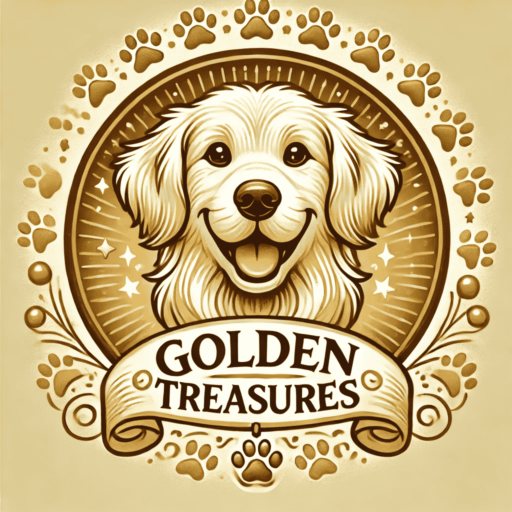
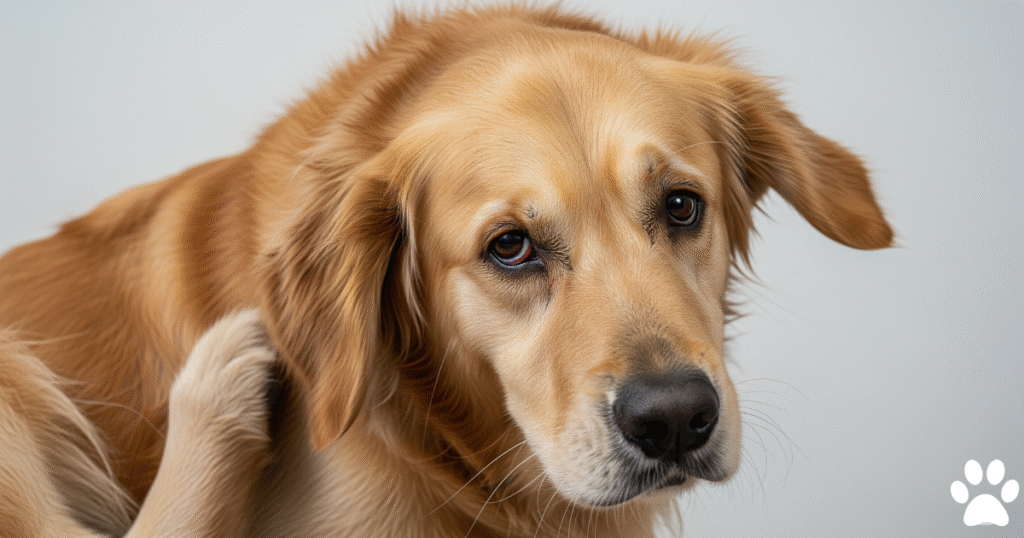
Links will be automatically removed from comments.